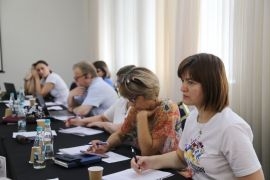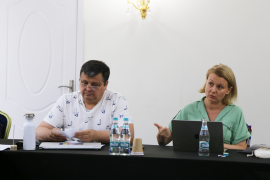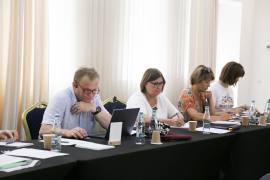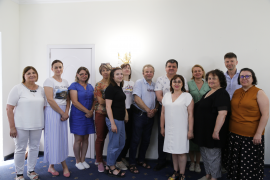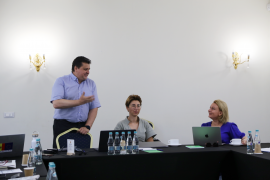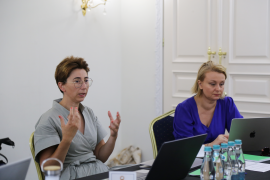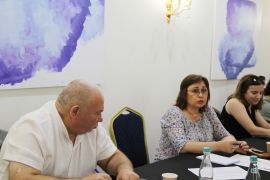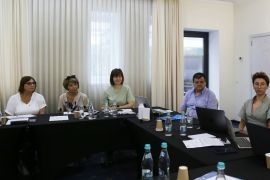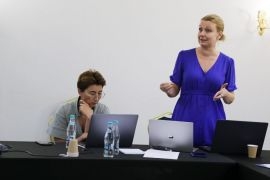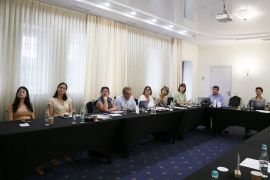back
Newspaper Editors, Into Home Stretch of Crisis Strategy Development
Some of the participants on the first day of training. Photo: API
You will not be able to solve all the problems you have included in your strategy, focus on the two or three most important ones and solve them; this will help you overcome the crisis and resist in the media market. Explain more clearly what you want to do, and when you have a completed document, work with it, do not leave it to dust in the drawer; it does not help if it sits there no matter how good it is. Editors and managers of independent newspapers received the latest advice on how to improve their business strategies in times of crisis from trainers Cristina Lupu (Romania) and Irina Ghelbur (Republic of Moldova). At API's "Strategic Organization of Newsroom Work in Times of Crisis" Training at the end of last week, participants had the opportunity to ask questions and get answers to a range of newsroom management challenges.
During the two-day training, Cristina Lupu and Irina Ghelbur analyzed and provided feedback on draft strategies being developed by ten print newsrooms included by API in the Crisis Support Program, drawing attention to areas for improvement. "We don't put every problem you face in the strategy, just the vital ones that you can solve at the same time; that will help you survive. Some strategies need to be compressed, be more concise in your expressions. Imagine you're riding in an elevator with someone and you have to tell them about your organization in a few moments to get them to buy your newspaper or give you publicity. What important things are you going to communicate knowing that you basically have no time? The same approach should be taken when formulating the strategy," Cristina Lupu said. "There is a visible difference in the strategies presented now compared to previous versions, you can see that you have worked on them and made progress. We can say that 80-90% of the products are already produced, the documents are well structured, and a little more effort is needed to complete them. Some actions in the strategy need to be prioritized, others – to have concrete timeframes for completion and people responsible for completion assigned. In the future, it is important to update, to see what things should be omitted, what should be fulfilled, what has lost its relevance, and what needs to be completed," Irina Ghelbur added.
Managers and development officers in newsrooms are pleased that they have been able to draw up a strategic document that will help them better organize their work. "The strategy is very important for us because it shows us how and in which direction to go to overcome the crisis, but also to analyze whether we have achieved our goal. Thank you for your help. It was also important for us to learn how to work efficiently with social networks, but especially with online platforms to raise funds from readers and sponsors," says Slava Perunov from SP newspaper in Bălți. "This is the first time that we have produced such a document. It will help us better organize our work, focus on problems and solve them. Some of the ideas presented will help us to attract publicity, to convince readers to buy our newspaper," added Maria Turcanu, Ecoul Nostru, Sângerei. "While developing the strategy we became more organized, we identified problems, risks, but also solutions that will help us get out of the crisis. We are now focusing on a better organization of the budget; we are better optimizing expenditure. In the future we will focus on developing our own online channels to promote our content, we will minimize our dependence on existing social networks to avoid potential risks of having restricted access to them," concluded Viorica Bejan, Observatorul de Nord, Soroca.
In the next ten days, the beneficiary newsrooms will finalize their crisis activity strategies, approve them and proceed with their implementation. This is one of the API conditions for partial financial support to independent newspapers after Russia's military invasion of Ukraine.
The training was conducted by the Association of Independent Press (API) within the project "Suрроrting lndependent Moldovan Newspapers," funded by the National Endowment for Democracy (USA).
